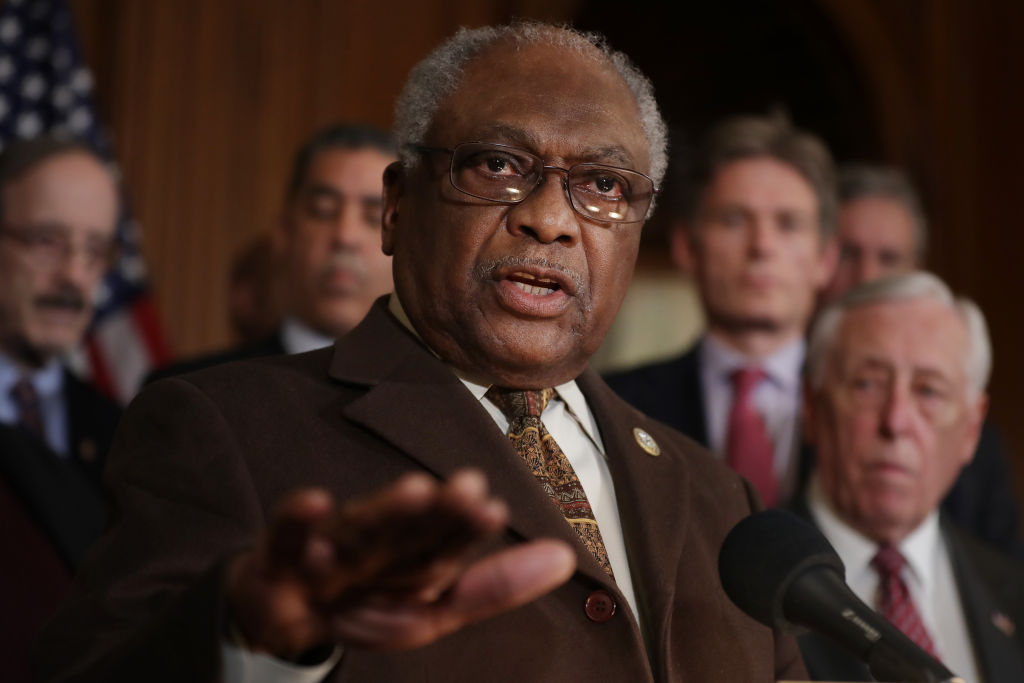The vast disparities in internet quality and speed have become even more apparent since the coronavirus pandemic forced millions to begin working and learning from home in March.
A release sent to Blavity confirmed House Majority Whip James Clyburn's plans to address the issue. On Wednesday, Clyburn introduced the Accessible, Affordable Internet for All Act, which will look to invest $100 billion in building affordable high-speed broadband infrastructure in unserved and underserved communities.
“Over a year ago, I formed the House Rural Broadband Task Force with the goal of bringing affordable high-speed internet to 100 percent of Americans,” Clyburn said in a statement to Blavity.
“Since then, the disparity between those served and unserved has become clearer. In my home state alone, nearly 1 in 10 South Carolina households lack access to a reliable broadband connection," Clyburn said. "That is why I am proud that the Rural Broadband Task Force, in collaboration with members of the Energy and Commerce Committee, crafted the Accessible, Affordable Internet for All Act to address this issue once and for all.”
Access to affordable high-speed internet has become a major issue nationwide, particularly for the millions of students who now have to attend school virtually. More than 125,000 schools have had to close their doors and digitally teach over 55 million students.
Nonprofit organization EducationSuperHighway said more than nine million students do not have internet connectivity at home, leaving them disadvantaged. With the virus continuing to spread across the country, there is little indication that schools will be able to open in the fall, potentially leaving those students months behind on schooling.
According to the Federal Communications Commission’s 2020 Broadband Deployment Report, more than 18 million people lack access to broadband, and Clyburn said experts widely agree that this number is understated.
Rep. Tom Malinowski said in a statement there are places in his New Jersey district where kids have to go to a youth center or a library parking lot after hours to do their homework because they don’t have access to broadband at home.
“The COVID-19 pandemic has laid bare the necessity of broadband, from homeschooling, to supporting our small businesses, to effectuating telemedicine. For far too long, our rural communities have been held back by a lack of access to this essential utility in the 21st century, and there is simply no excuse," New York Rep. Antonio Delgado said in a statement.
Clyburn announced the bill during a press conference on Wednesday afternoon.
The Accessible, Affordable Internet for All Act has bipartisan support and will include $80 billion to deploy broadband infrastructure nationwide. According to the bill, Congress is also allocating $5 billion for low-interest financing of broadband deployment through a new secured loan program and establishing a new office within the National Telecommunications and Information Administration to ensure efficient use of federal money.
The bill also looks to make sure the high-speed internet is affordable by requiring providers to offer cheaper plans. The FCC will now have to report what broadband prices are around the country. There are also provisions that would require companies to provide a $50 monthly discount on plans for low-income consumers.
There will be $1 billion allotted for grant programs that will allow states to improve broadband options and another $5 billion specifically meant for students who do not have internet access at home.
Congress will double down on a measure a number of local school districts have tried out: school bus Wi-Fi. School districts around the country have used school buses to provide internet in certain areas where the internet connection is limited. The bill will provide more funding for these efforts, particularly in communities that are more remote.
Olivia Wein, staff attorney with the National Consumer Law Center, said the moves to teleworking and schooling from home have been devastating for Black families in communities that often do not have high-speed internet or are on plans that cannot have multiple people accessing the internet at once.
“Black, Hispanic, American Indians and Alaska Natives have lower broadband subscription rates than their White counterparts, and one of the main barriers to broadband service is cost," Wein said.
"The Broadband Service for Low-income Consumers program will help close the digital divide by providing low-income households with a $50 broadband benefit ($75 for households on Tribal lands) and the Digital Equity Program will ensure consumers have the digital skills necessary for full participation in our society. On behalf of our low-income clients, we commend the leadership of Whip Clyburn in introducing this critically important bill,” she said.
